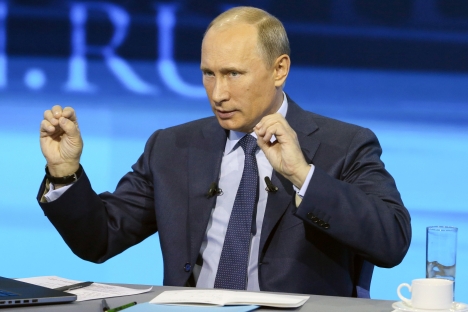
During his televised session, Vladimir Putin discusses a range of domestic and international problems, including international terrorism, corruption and the plight of opposition. Source: ITAR-TASS
Russian President Vladimir Putin’s televised session fueled speculations among political pundits about the future of Russian politics, the President’s controversial image and his approach seemingly aimed at establishing a dialogue with ordinary people.
While some pundits argue that the new format of the live broadcasts indicates that Putin is a ready to adjust to the new political reality, others regard his Q&A marathon as a well-orchestrated political show.
Russian president to host live call-in show on Thursday
'Operative in the Kremlin': De-mystifying Putin
Experts explain why Putin tops in list of most powerful people
Vice-President for Center for Political Technologies Georgy Chizhov was surprised by the new aspects introduced by this year's the Q&A session.
“Previously, the audience wasn’t so diverse while now the situation has been changed: The questions came from representatives of different sectors of the Russian society,” he said. “Symbolically, it means something. [Keeping in mind the December protests], Putin wants to show that he is the president of all Russians.”
Chizhov went on to argue that this symbolism, however, has a tint of falsity because it was shown so “vividly” and “purposely” that one cannot help but putting all the show into question, Chizhov said. According to him the new features of the show can be read in two contrasting ways. On the one hand, it might be an attempt to find a new political style and adjust to the new political agenda. On the other, it could demonstrate that Russia’s politics is nothing but a heavy dose of political theater.
Political pundit Stanislav Radekevich was also surprised by the format of Putin’s direct line.
“I don’t see why it was necessary to conduct such a long direct Q&A session with people in live format if Putin has a well-organized press service,” he said. “And this surprised me most.”
In reality, Putin will not really get the whole picture concerning the needs of ordinary people if there is a thorough filtration not only questions, but also people, according to Radkevich.
Dmitry Orlov, head of Agency for Political and Economic Communication, is instead satisfied with Putin’s televised session and his new communicative approach to people.
“This direct line with people was [a great deal of] pressure for Putin, he endured this blow and this was in the spotlight,” he said. In his opinion the show presented a challenge for the President who was bombarded with both convenient and inconvenient questions that came from both high-profile figures and ordinary people.
“I was also surprised that Putin admitted that he made an offer to [former Finance Minister Alexei] Kudrin to join his team and that the latter refused it,” Orlov said. “This move just indicated that the President appreciates Kudrin’s political and economical heft.”
However, other Russian experts are not surprised by Putin and argue that his behavior was quite predictable.
In contrasts, Yuri Korgunyuk, an expert from the Moscow-based INDEM think tank believes that Putin “just demonstrated that he was not afraid of being another Lukashenko [Belarus President],” introducing himself as an authoritative leader who controls everything.
“It cannot be surprising for me,” the expert said.
Almost all pundits agreed that Putin’s debate with Alexei Kudrin indicates that he may not be quiet satisfied with the work of the government and he might be looking for an eligible person to tackle domestic economic problems.
According to Evgeny Minchenko, Director of International Institute for Political Expertise, the debate between the President and the former Finance Minister is “a sign to the government that if it doesn’t show good economic and political standing, another option may be easily found.”
All rights reserved by Rossiyskaya Gazeta.
Subscribe
to our newsletter!
Get the week's best stories straight to your inbox